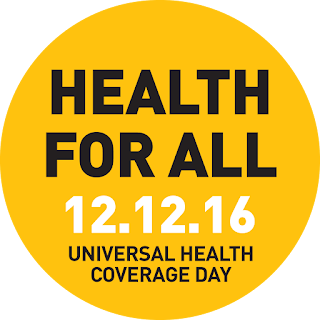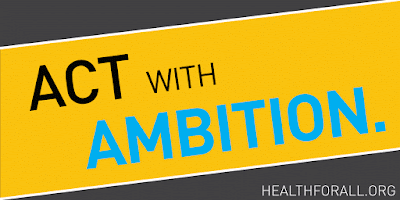Universal Health Coverage (UHC) means everyone can access the quality health services they need without financial hardship.WHO: All people, including the poorest and most vulnerable.WHAT: Full range of essential health services, including prevention, treatment, hospital care and pain control.HOW: Costs shared among entire population through pre- payment and risk-pooling, rather than shouldered by the sick. Access should be based on need and unrelated to ability to pay.
UHC means that all individuals and communities receive the health services they need without suffering financial hardship. It includes the full spectrum of essential, quality health services, from health promotion to prevention, treatment, rehabilitation, and palliative care.
- family planning
- antenatal and delivery care
- full child immunization
- health-seeking behaviour for child illness.
- tuberculosis treatment
- HIV antiretroviral treatment
- coverage of insecticide-treated bed nets for malaria prevention
- adequate sanitation.
- prevention and treatment of raised blood pressure
- prevention and treatment of raised blood glucose
- cervical cancer screening
- tobacco (non-)use.
- basic hospital access
- health worker density
- access to essential medicines
- health security: compliance with the International Health Regulations.
- All UN Member States have agreed to try to achieve universal health coverage (UHC) by 2030, as part of the Sustainable Development Goals.
- UHC provides access to quality essential health services; safe, eff
ective, and affordable essential medicines and vaccines; and protection from financial risk. - At least 400 million people globally lack access to one or more essential health services.
- Every year 100 million people are pushed into poverty and 150 million people suffer financial catastrophe because of out-of-pocket expenditure on health services.
- On average, about 32% of each country’s health expenditure comes from out-of-pocket payments.
- Ensuring equitable access requires a transformation in how health services are funded, managed, and delivered so that services are centred around the needs of people and communities.
- More than 18 million additional health workers will be needed by 2030 to meet the health workforce requirements of the Sustainable Development Goals and UHC targets, with gaps concentrated in low- and lower-middle-income countries.
- Globally, two thirds (38 million) of 56 million deaths each year are still not registered.






